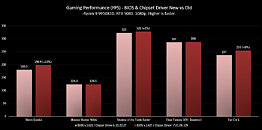
ASRock Issues Update on No Boot & CPU Damage Incidents on AMD Platform
We are aware of a number of cases where some AMD CPUs have boot issues with specific BIOS versions, and case with ASRock motherboard involving damaged CPU. We are taking these incidents seriously and have reached out to many of the affected users to gather information. We have obtained some of the motherboards for thorough inspection.
- A retrieved motherboard was in a system where the CPU showed burn damage. When inspecting this motherboard, we found that the motherboard does not have obvious damage nor burn marks around the VRM area. Measurements of the motherboard are also within spec. After cleaning and removing debris from the CPU socket, without further repair, the motherboard can boot up successfully with original onboard BIOS. It also passed long-term stress tests.
- With some BIOS versions, we have noticed some systems are not being able to boot with random 9000-series CPUs. BIOS 3.20 fixes this issue by improving memory compatibility.





































































